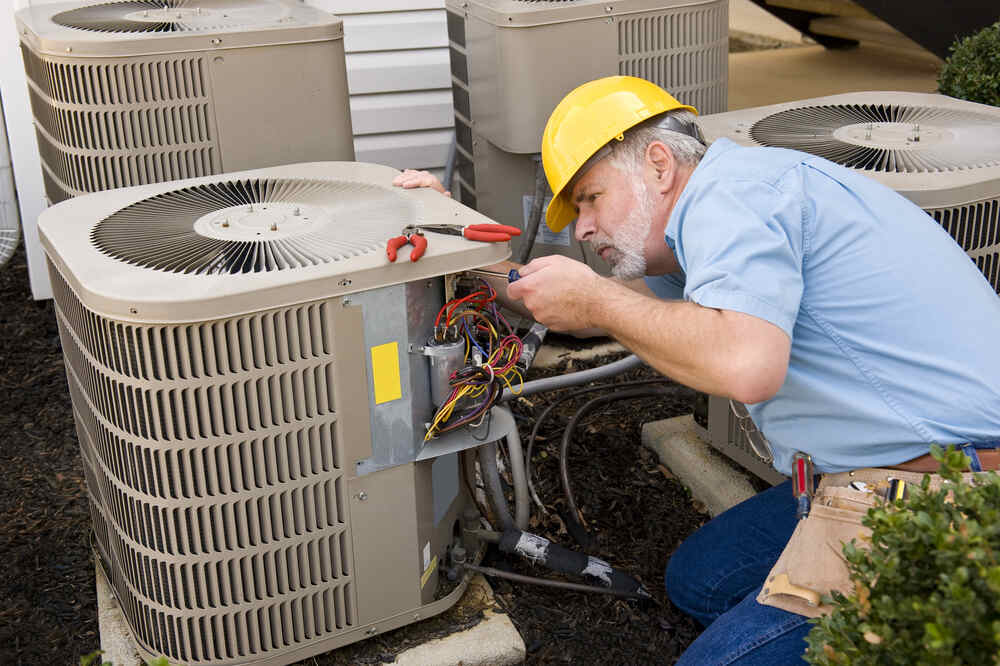Air conditioners are complex systems, but they are designed to function in predictable ways. If your air conditioner is behaving erratically, it may be a sign that something is wrong. One frequent issue that people experience with their cooling systems is that the air conditioner turns on and off repeatedly during use. If you are experiencing such a problem with your air conditioner, you’ll want to read this article and learn more about what might be happening so that you can take appropriate action.
Is it a Problem When Your Air Conditioner Turns on and Off Repeatedly?
The first thing you should understand about an air conditioner that turns on and off repeatedly is that such behavior is not normal. However, it’s a common problem—so widespread, in fact, that HVAC service technicians have a name for it: short cycling. Short cycling can be caused by numerous issues, some of which are more serious than others. However, if you catch your system short cycling, it’s usually best to find the problem and address it as quickly as you possibly can. After all, if it’s a significant problem, you’ll want to fix it before it causes irreparable damage to your system.
What Causes an Air Conditioner to Short Cycle?
Below are the most common causes of short cycling in home air conditioners:

-
The thermostat is in the wrong place.
Your thermostat does more than merely set the desired temperature for your home. It also collects information on the temperature and uses it to turn the system on or off as needed. For example, if your thermostat is set to 70 degrees Fahrenheit and it detects a temperature of 88 degrees in your home, it will tell the air conditioner to turn on until the temperature adjusts. However, certain circumstances can cause your thermostat to misread the temperature in your home and send conflicting signals to the air conditioner. If your thermostat is located near an open window, an appliance that produces heat (such as a space heater or oven), or underneath a skylight, it can become confused. As such, your air conditioner will be told to turn on or off far more likely than is required of it, and you will experience short cycling.
-
The air filters are dirty.
The air filters in your system are responsible for preventing foreign materials from coming in through the outdoor unit and causing problems. Soiled air filters may be unable to keep all this material from entering the system. One of the significant issues that dust and dirt can cause when they make their way into an air conditioner is that they build up and prevent enough air from flowing across your evaporator coils. If this occurs, your evaporator coils may freeze. Without functioning evaporator coils, the system will struggle to complete the cooling process. As a result, it may turn on and off again in short bursts.
-
There is a refrigerant leak.
Refrigerant is directly responsible for removing heat from the air inside your house. It moves through your system in a cycle—collecting heat from inside and transferring it outside via a series of state changes. The pressure of the refrigerant is a vital part of its ability to change states, so when there is not enough refrigerant in the system, it can cause the components responsible for these state changes to struggle. One such component is your compressor, which turns off automatically if the level of refrigerant is too low. Running the air conditioner in this state will cause your compressor to shut off every time it is activated, causing the system to short cycle.
-
The system itself has been sized to your home improperly.
Finally, your air conditioner may just be too large and powerful for the home in which it is installed. An overly powerful air conditioner will cool the space faster than necessary, causing it to shut off more quickly than expected.
What Short Cycling Causes Should You Worry About Most?
Not all causes of short cycling are emergencies, but all of them can be problematic. A thermostat in the wrong place may not cause devastating system damage, but it will make it difficult for you to control the climate in your home with consistency. Dirty air filters can cause substantial damage over time by letting significant quantities of foreign matter into your air conditioner, but it is quite easy to solve this problem by changing or cleaning your filters once a month and arranging for duct cleaning every two to five years.
Other causes of short cycling may be more dire and should be dealt with quickly to avoid severe consequences. A compressor failure caused by leaking refrigerant will likely cost well over a thousand dollars to fix, and a system that is too large for your home will cost you hundreds of unnecessary dollars to run it over the years.
Since an air conditioner that turns on and off repeatedly can be due to any of the issues listed above, it is best to err on the side of caution whenever you notice it occurring. Contact a licensed HVAC professional and have them find the cause of the issue so that you can make an informed decision as to what to do next.
Check with us here at Valley Comfort Heating and Air, our customers love our attention to detail and our friendly, affordable service. (707) 539-4533
FAQ Section: Air Conditioner Short Cycling
1. Why does my air conditioner turn on and off repeatedly?
Your air conditioner turning on and off repeatedly is known as short cycling. This behavior typically occurs due to issues like an improperly placed thermostat, dirty air filters, or low refrigerant levels. Short cycling forces your system to work harder, leading to increased energy costs and potential system failure. Addressing this issue promptly is crucial to avoid costly repairs and ensure your home stays comfortable.
2. Can a faulty thermostat cause my air conditioner to short cycle?
Yes, a faulty or poorly located thermostat can cause your air conditioner to short cycle. If your thermostat is near a heat source or in direct sunlight, it might misread the temperature, leading to frequent cycling. Relocating the thermostat to a more central location or replacing it can solve this issue, ensuring consistent cooling throughout your home.
3. How do dirty air filters contribute to short cycling in my air conditioner?
Dirty air filters restrict airflow, causing your evaporator coils to freeze. This leads to the system shutting off prematurely to prevent damage, resulting in short cycling. Regularly replacing or cleaning your air filters can prevent this problem, improve airflow, and enhance the overall efficiency of your air conditioner.
4. What are the dangers of ignoring short cycling in my air conditioner?
Ignoring short cycling can lead to significant damage to your air conditioner, including compressor failure, which can cost over $1,500 to repair. Additionally, it increases your energy bills by forcing the system to work inefficiently. To avoid these costly consequences, it’s essential to address short cycling as soon as you notice it.
5. Is short cycling a sign that my air conditioner is too large for my home?
An air conditioner that’s too large for your home will cool the space too quickly, leading to short cycling. This rapid cooling and shutting off can wear down the system faster and cause uneven temperature distribution. Properly sizing your air conditioner is key to avoiding these issues and ensuring efficient cooling.
6. How can refrigerant leaks cause short cycling in an air conditioner?
Refrigerant is essential for cooling, and a leak can disrupt the pressure levels in your system, leading to short cycling. This not only reduces the cooling efficiency but also risks damaging the compressor. If you suspect a refrigerant leak, it’s important to contact a professional immediately to fix the issue and recharge the system.
7. Can short cycling increase my energy bills?
Absolutely. Short cycling forces your air conditioner to start up frequently, which consumes more energy than running a normal cooling cycle. This increased energy usage will be reflected in higher utility bills. Regular maintenance and timely repairs can help prevent short cycling, saving you money in the long run.
8. How does short cycling affect the lifespan of my air conditioner?
Short cycling puts unnecessary stress on your air conditioner’s components, particularly the compressor. This added strain can lead to premature wear and tear, shortening the overall lifespan of your system. Addressing the root causes of short cycling can help prolong your air conditioner’s life and ensure it operates efficiently.
9. What maintenance steps can prevent short cycling in my air conditioner?
Preventing short cycling involves regular HVAC maintenance, such as cleaning or replacing air filters every 1-3 months, checking refrigerant levels, and ensuring your thermostat is properly placed. Scheduling annual inspections with a professional can also help identify and resolve issues before they lead to short cycling.
10. When should I consult a professional about short cycling in my air conditioner?
If your air conditioner is short cycling and basic troubleshooting like replacing the air filter or adjusting the thermostat doesn’t resolve the issue, it’s time to consult a professional. Persistent short cycling can indicate deeper issues such as refrigerant leaks or a malfunctioning compressor, both of which require expert attention to prevent further damage.



